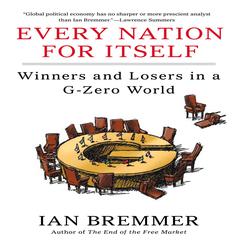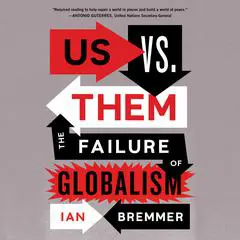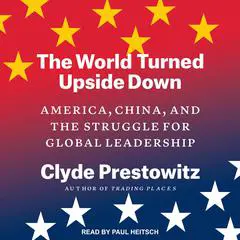 Play Audiobook Sample
Play Audiobook Sample
Superpower: Three Choices for America's Role in the World Audiobook
 Play Audiobook Sample
Play Audiobook Sample
Quick Stats About this Audiobook
Total Audiobook Chapters:
Longest Chapter Length:
Shortest Chapter Length:
Average Chapter Length:
Audiobooks by this Author:
Publisher Description
America will remain the world’s only superpower for the foreseeable future. But what sort of superpower? What role should America play in the world? What role do you want America to play? Ian Bremmer argues that Washington’s directionless foreign policy has become prohibitively expensive and increasingly dangerous. Since the end of the Cold War, U.S. policymakers have stumbled from crisis to crisis in Afghanistan, Iraq, Iran, Libya, Syria, and Ukraine without a clear strategy. Ordinary Americans too often base their foreign policy choices on allegiance or opposition to the party in power. We can no longer afford this complacency, especially now that both parties are deeply divided about America’s role in the world. The next presidential election could easily pit an interventionist Democrat against an isolationist Republican—or the exact opposite. As 2016 rapidly approaches, Bremmer urges every American to think more deeply about what sort of country America should be and how it should use its superpower status. He explores three options: Independent America asserts that it’s time for America to declare independence from the responsibility to solve other people’s problems. Instead, Americans should lead by example—in part, by investing in the country’s vast untapped potential. Moneyball America acknowledges that Washington can’t meet every international challenge. With a clear-eyed assessment of U.S. strengths and limitations, we must look beyond empty arguments over exceptionalism and American values. The priorities must be to focus on opportunities and to defend U.S. interests where they’re threatened. Indispensable America argues that only America can defend the values on which global stability increasingly depends. In today’s interdependent, hyperconnected world, a turn inward would undermine America’s own security and prosperity. We will never live in a stable world while others are denied their most basic freedoms—from China to Russia to the Middle East and beyond. There are sound arguments for and against each of these choices, but we must choose. Washington can no longer improvise a foreign policy without a lasting commitment to a coherent strategy. As Bremmer notes, “When I began writing this book, I didn’t know which of these three choices I would favor. It’s easy to be swayed by pundits and politicians with a story to sell or an ax to grind. My attempt to make the most honest and forceful case I could make for each of these three arguments helped me understand what I believe and why I believe it. I hope it will do the same for you. I don’t ask you to agree with me. I ask only that you choose.”
Download and start listening now!
Superpower Listener Reviews
Be the first to write a review about this audiobook!
About Ian Bremmer
Ian Bremmer is a political scientist who helps business leaders, policymakers, and the general public make sense of the world around them. He is president and founder of Eurasia Group, the world’s leading political-risk research and consulting firm, and GZERO Media, a company dedicated to providing intelligent and engaging coverage of international affairs. He is also a frequent guest on CNN, Fox News, MSNBC, the BBC, Bloomberg, and many other television stations around the world. He is the author of ten books, including the bestseller Us vs. Them: The Failure of Globalism which examines the rise of populism across the world. He also serves as the foreign affairs columnist and editor at large for Time magazine. He currently teaches at Columbia University’s School of International and Public Affairs and previously was a professor at New York University.
About Willis Sparks
Willis Sparks focuses on top global political risks as well as US politics and elections. Willis also works directly with Eurasia Group’s president Ian Bremmer on a variety of macro-political risk projects. Prior to joining Eurasia Group in 2005, Willis worked at the Council on Foreign Relations, where he wrote on transnational terrorism and US national security. Willis holds an MA in International Affairs from Columbia University’s School of International and Public Affairs, where he specialized in international security policy and the study of the former Soviet Union. He also earned an MA degree in International Relations from the Institut d’Etudes Politiques in Paris. Willis holds two BA degrees from Brown University and is a graduate of the Juilliard School.




























